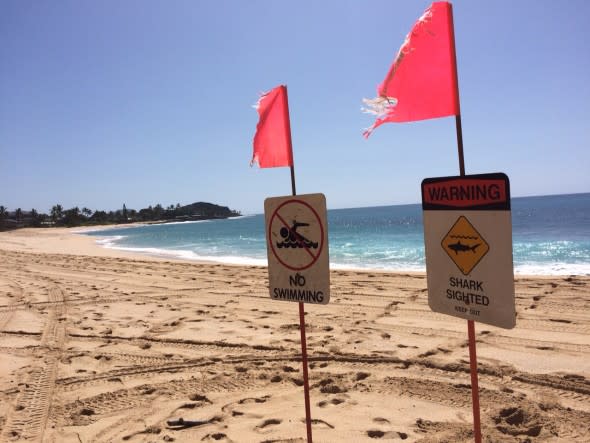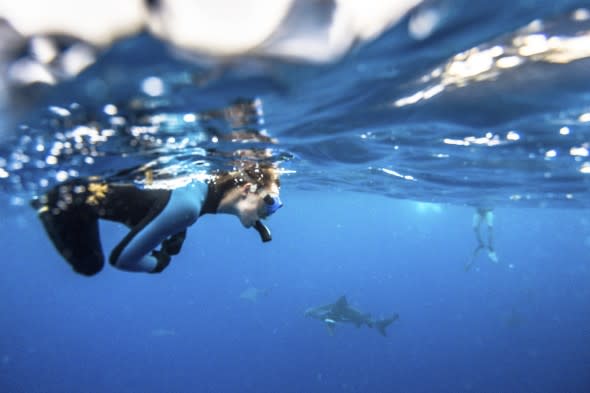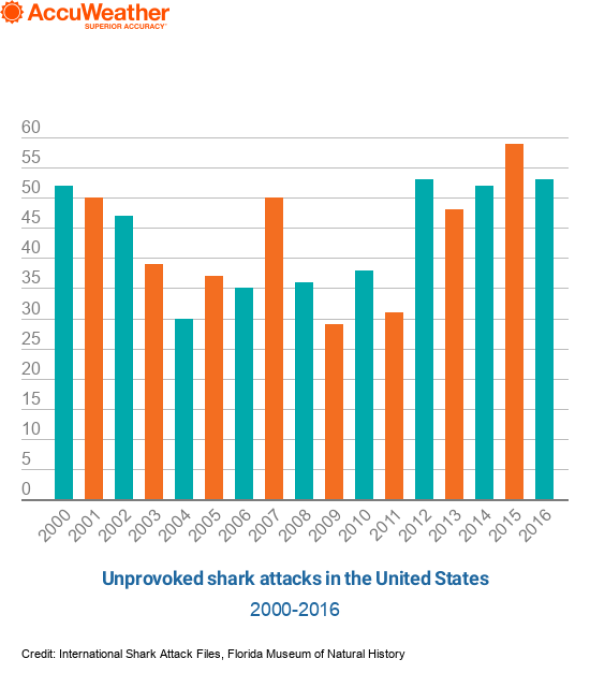Expert explains how to survive the unlikely event of a shark attack
Chances are most people who have swam in the ocean have been very close to sharks and didn't even know it; however, some haven't been so lucky.
Although shark attacks are incredibly rare, if you're in the ocean, it's good to be on the safe side and follow the advice of experts.
Jimi Partington, one of the world's leading great white shark experts who has also been featured on Shark Week, said that in most cases with most sharks, you will only see the shark for a few moments, as the animal will soon be on its way.
However, Partington said that this changes if you spot a large predatory shark such as a great white, bull or tiger shark.
"If dealing with a large predatory shark, then the safest and most logical thing to do is to exit the water as calmly as possible. If this is easier said than done in your situation, then I would suggest keeping a close eye on the shark," Partington said.

Signs warning of a shark sighting are posted at Makaha Beach Park in Waianae, Hawaii, Thursday, Oct. 29, 2015. (AP Photo/Audrey McAvoy)
Rather than panicking, splashing and making noise, you should hold your ground, as the shark will soon realize that you are unafraid and not its typical choice of food, and it will eventually move away.
There are two main types of attacks from sharks. The first is a full predatory attack, which is when a shark mistakenly thinks of a human as its prey. The second type of "attack" is when a shark is testing to see what you are.
Don't panic if the shark starts to attack, because there are still a couple of things you can do to get yourself out of the situation.
A full predatory attack is the type that in most cases, if from a large shark, ends up being fatal.
"My number-one bit of advice in this scenario would be to fight back as best you can. You are trying to tell the shark that it has made a mistake and you are not its normal source of food. To do this, go for the eyes and the gills, as these are the most sensitive areas of the shark," Partington said.
Depending on what you are doing in the water, use the items you have with you to your defense.
"Use your surfboard to create a barrier between you and the shark, or if spearfishing, even give the shark a few 'bumps' to let it know that you are a threat and not its usual prey," Partington said.
According to the International Shark Attack File (ISAF), if you are attacked by a shark, hitting a shark on the nose, ideally with an inanimate object, usually results in the shark temporarily curtailing its attack.
If a shark actually bites, the ISAF suggests clawing at its sensitive eyes and gill openings. It is also recommended that you should not act passively if you are under attack, because sharks respect size and power.
If you have successfully avoided the attack and the shark has let go, Partington suggests using any remaining energy you have to continue attacking the shark. He said the animal should quickly realize you are not its natural prey and, with the threat of being injured itself, will soon swim away.

A snorkeler looks at the black tips sharks in Jupiter, Florida. (Chris Garrison/Red Bull Content Pool via AP Images)
"The second type of 'attack' is when a shark is testing to see what you are. Think of it this way; sharks don't have hands, so they sometimes test objects with their mouths, but of course, this can be lethal for us," Partington said.
The shark may not be showing aggressiveness at this point, just curiosity, said Partington.
"Hold your ground, fight the shark and even swim towards the animal confidently. The worst thing to do in this scenario is to swim away panicking," Partington said.
"If the shark has been testing you for the past few minutes by watching your body language to see if you are prey and you then start to act just like its natural prey, then of course this may stimulate the shark, which could possibly lead to a investigatory bite," Partington said.
It's best to be dominant, be confident and, in most cases, the shark will swim away. That might be hard to do in that scenario, but it could save your life.

"If the shark has swam away after its initial attack, the chances are that it realized you were not its natural prey and has moved off. Rarely will it return," Partington said.
However, if your blood is in the water and the shark is overexcited, then there is still a slim chance it may return.
If the shark swims away but can still be seen, then fighting back if you have the energy is best.
"If you do not have the energy, then there is no other advice I can give apart from exit the water as soon as possible. If you are injured with blood in the water, you don't want to stay still and potentially have the shark return," Partington said.
The main threat at this point will be blood loss, so you will need to stop the flow of blood and seek medical treatment as quickly as possible. The longer you stay in the water, the more blood will be lost.
"Simply put, sharks are not out to get us. I have been working around them for the past 10 years and if that was the case, I would have been eaten a long time ago. Sharks are just doing the same thing all living creatures on Earth are doing: trying to survive," Partington said.
Partington says the scariest fact is that for each shark that does kill a human, many millions of sharks are killed for their fins or for their meat, in bycatch and by illegal poaching.
With the ocean's shark numbers lower than ever before, seeing a shark should be seen as a positive encounter, he said.
For more safety and preparedness tips, visit AccuWeather.com/Ready.

